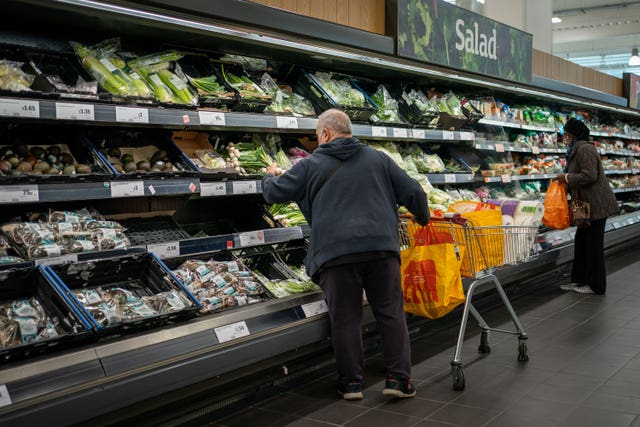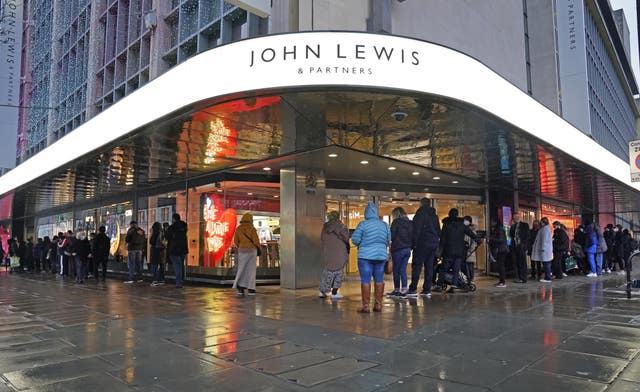
Vanessa Feltz 3pm - 6pm
14 January 2022, 15:14

Here the PA news agency examines closer which retailers and parts of the sectors started the new year in fine spirits.
Christmas is always a pivotal period for retailers and other high street firms but perhaps had even greater significance this year after 2020’s efforts were hammered by Covid closures.
The key trading period was still beset by a raft of challenges, ranging from supply delays due to problems at ports to labour shortages.
However, a number have already revealed their profits are ahead of expectations after strong recent trading.
Here the PA news agency examines closer which retailers and parts of the sectors started the new year in fine spirits and who has growing cause for concern:
Winners
Grocers
The UK’s biggest supermarket bosses were among the chirpiest after another busy festive season.
Both Tesco and Sainsbury’s raised their profit guidance as the rapid spread of the Omicron variant caused cautious shoppers to spend more time at home and fill up their baskets higher.

Tesco said its festive sales were 8.8% higher than pre-pandemic levels, with reported grocery growth of 6.6%.
Researchers at Kantar found that supermarket sales hit £11.7 billion in December – just 0.2% down on the record-breaking same month a year ago when strict restrictions were in place.
The Kantar figures also revealed that German discounters Aldi and Lidl performed particularly strongly, with customers lapping up their premium ranges as they kept an eye on value over Christmas.
Fashion and jewellery
Fashion retailers have faced challenges throughout the pandemic, but had a broadly positive Christmas.
Next was the first retailer to report rising profits this reporting season as it said sales were better than expected before Christmas.
Lisa Hooker, leader of PwC’s consumer markets team, said other fashion firms also have reason for optimism after customers started to spend more on party clothes and smarter items again.
“A year ago, fashion and apparel was one of the weaker areas but all the data we have seen so far has shown it was one of the strongest performers this Christmas,” she said.
“Some of the areas that were weaker over the past year have strengthened, particularly occasion-wear, with more dresses being sold in the run up to Christmas.”
Ms Hooker also highlighted that jewellery and watch retailers performed well as consumer savings built up since the pandemic started were used to buy more expensive Christmas gifts for loved ones.
Homeware
Demand for home products and DIY items has been buoyant throughout the past year as people spent more time in their homes and decided they wanted to spruce them up.
The sector is also expected to have a strong start to 2022, with the start of the year a typically busy time for DIY work and purchasing big ticket items.

Growth is also expected to continue due to long lead times on products such as sofas and other furniture which have been exacerbated by the pandemic.
Kien Tan, retail strategy director at PwC, said: “Nesting has continued so, although December is not typically big for furniture, people have been spending money on decorating their homes ahead of Christmas, which has been really good for the likes of Dunelm.
Losers
Electronics
A global chip shortage continued to impact electronics retailers over the key trading period for the sector.
Although demand was still strong, retailers including Currys and Argos were impacted by difficulties in securing sufficient numbers of popular tech products – such as the PS5 and Apple items – to meet consumer demand.
Currys saw sales fall five percent over the 10 weeks to January and trimmed back its profit predictions as a result.
Boss Alex Baldock said the company would have liked more stock of popular items but highlighted that it secured better supply than some of its major competitors.
Toys and baby products
Data from the BRC-KPMG retail sales monitor for December showed that the toys and baby equipment sector saw one of the most significant declines across the wider industry.
Ms Hooker told PA that many shoppers brought forward their Christmas shopping for items such as toys due to early calls from retailers, such as The Entertainer, for customers to act early to avoid potential disruption.
She said: “Typically you might expect more activity in the category before Christmas but some of that spending took place earlier this year.”
Ms Hooker also questioned whether a reduction in the birth rate, revealed by the ONS earlier this week, might also be weighing on sales for baby-related items.

Hospitality
The strong showing by grocery retailers was not to the detriment of another part of the retail sector but rather highlighted the poor December performance among hospitality firms.
Retail analyst Richard Hyman told PA: “You can’t really say there were any particularly losers in grocery because they all benefited from Omicron as people were cautious about going out.
“People ate more meals at home, so grocers were happy across the board while pubs and restaurants were going to be weaker across the board.
All Bar One owner Mitchells & Butlers was the first major pub and bar owner to reveal its Christmas trading earlier this week, as it highlighted a sharp decline in drinker numbers over the four weeks around Christmas.
Meanwhile, industry data from UKHospitality and CGA showed a 60% slump in trade on Christmas Day, as well as 31% and 27% falls on Boxing Day and New Year’s Eve respectively, two other key dates for the sector.
Don’t know
The latest announcements from a raft of public and privately owned firms have unveiled the key trends about how certain types of stores fared, but some companies have held back from revealing how they have performed.
Supermarket giants Asda and Morrisons have previously posted updates over Christmas trading but have not revealed their latest trading performances after both were the subject of takeovers in the past 18 months.
Figures from Kantar suggest Asda sales the three months to December 26 were 3.9% down against last year and that Morrisons sales were 6.5% lower, although both were significantly ahead of pre-pandemic levels.

Meanwhile, troubled high street stalwart John Lewis & Partners has also not updated the market on its performance.
Mr Hyman said there is reason to suspect John Lewis might have had a tough Christmas but told PA that shoppers should not read too much into retailers’ decisions not to post Christmas trading updates.
“I don’t think John Lewis would post a Christmas trading update even if they were doing incredibly well,” he said.
“Broadly, I think the companies who had a strong year will have done well at Christmas so there is every reason to think a company like John Lewis had a more challenging time.”